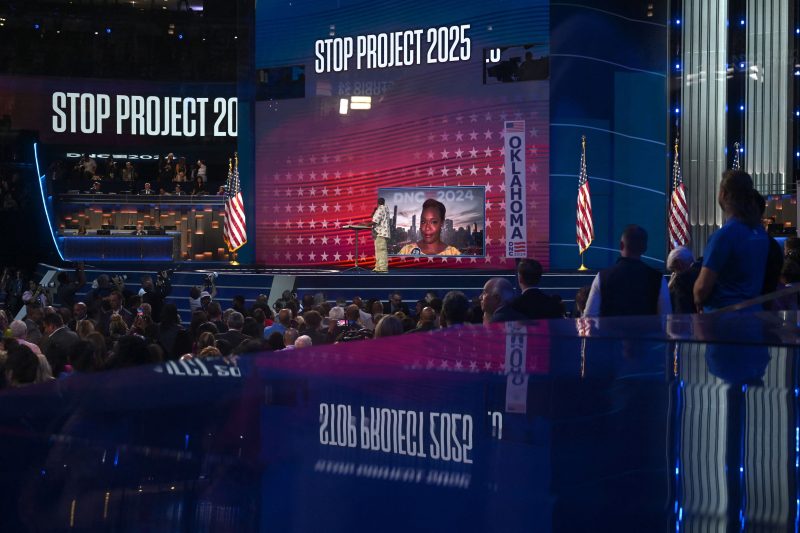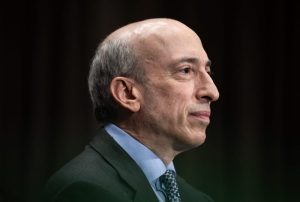How Democrats made Project 2025 one of their top anti-GOP attacks
No one expected the 922-page policy document to go viral.
The conservative Heritage Foundation quietly began working on Project 2025 in 2022, pulling together a wish list of far-right policy proposals the group hoped former president Donald Trump would enact if he won back the White House. The report was published with little notice in 2023.
Then, in March, the Biden-Harris campaign began attacking the conservative initiative through a coordinated push on social media timed to President Joe Biden’s State of the Union address, warning the public that Project 2025 was a blueprint for the extreme and dangerous agenda a second Trump term would usher in.
In June, comedian John Oliver devoted an entire episode of his popular HBO show to the policy initiative, and actress Taraji P. Henson used her high-profile role as host of the BET Awards to raise alarms about it.
“Pay attention! It’s not a secret: Look it up!” Henson told the audience, in a clip that was viewed more than 8 million times in 48 hours. “… The Project 2025 plan is not a game. Look it up!”
By the time Trump took to Truth Social on July 5 to personally disavow the initiative — “I know nothing about Project 2025,” he wrote, adding that some of the proposals were “absolutely ridiculous and abysmal” — the topic had already exploded on social media, and Democrats had alighted on a potent message that could damage Trump politically.
How an obscure Heritage Foundation policy tome emerged as a defining Democratic attack of the 2024 election is a story of fortuitous mentions, organic online momentum, an ominous-sounding name and a document that captures the myriad fears many Democratic voters have about what another Trump presidency could mean.
The sweeping policy document lays out how the next president could concentrate power in the executive branch and remove civil service protections for legions of federal workers to replace them with loyalists. It provides detailed plans for executing some of Trump’s most controversial ideas, such as eliminating the Department of Education; moving the Justice Department under presidential control; shuttering the National Oceanic and Atmospheric Administration, which forecasts weather and tracks climate change, and rolling back other environmental protections; and launching mass deportations, including of immigrants who came to the United States as children, often known as “dreamers.”
The document also includes other policies that Trump has not embraced, including a call for the elimination of the popular Head Start program, rescinding Food and Drug Administration approval of mifepristone — a key abortion medication — and using an 1873 law to prevent shipments of abortion medication through the mail, which he recently told CBS News he would not enforce.
A line-by-line review of the Project 2025 document by CBS News identified 700 policy proposals and found that at least 270 of them matched Trump’s past or current campaign proposals. The review also found that at least 28 of the project’s 38 primary authors — nearly 75 percent — worked in the Trump administration.
Jef Pollock, whose firm, Global Strategy Group, is one of the pollsters for Vice President Kamala Harris’s presidential campaign, said the forward-looking nature of Project 2025 — articulating in granular detail what a hypothetical second Trump term could look like — helped crystallize voter fears in a tangible way.
“Voters understand that this is an actual, written plan for extremist and dangerous ideas that are going to be implemented,” Pollock said. “We know that voters have some Trump amnesia. They don’t remember all the bad things he did as president. Now it’s like, ‘Well, even if you’ve forgotten about what he did before, what he wants to do now is even worse.’”
‘An unwelcomed distraction’
Despite the best efforts of the Heritage Foundation, there was little fanfare when the conservative think tank first published the Project 2025 document, titled “Mandate for Leadership: The Conservative Promise,” in April 2023.
But as soon as Project 2025 began getting a sliver of mainstream media attention months later, Trump and his campaign tried to distance him from the document, even though many of his former top aides — including former Office of Management and Budget director Russell Vought and former personnel chief John McEntee — advised or contributed to the effort.
In November, Trump advisers released a statement saying that while such outside efforts were “certainly appreciated and can be enormously helpful,” they were merely “recommendations.”
Another statement came in December, when the same advisers wrote that the outside suggestions were not officially sanctioned and were “an unwelcomed distraction.”
Trump’s campaign has also redirected voters to the former president’s own Agenda 47 — a 20-point missive outlining his priorities — as well as the Republican Party platform, which his campaign carefully streamlined before adopting it in July.
“It’s literally the definition of the ‘big lie’ theory — that if you say the same thing over and over and over again enough times, you can persuade people it’s true and they’ve attempted that,” Trump spokesman Brian Hughes said.
“The only person deciding what President Trump will say or what President Trump will do as president is Donald Trump,” Hughes continued. “What’s most ironic is that while they are spending all this time trying to lie about what policies President Trump has or will advocate for as president, we still have a Harris website that has a half-dozen or more donate buttons but no policy tab.”
Heritage Foundation officials have also tried to counter what they view as misinformation, launching a new website “to counter the left’s worst lies about Project 2025,” Heritage Foundation President Kevin D. Roberts told members in an email Friday morning.
Privately, some Heritage members blame the Trump campaign for elevating Project 2025 by responding to Democratic attacks.
By pushing the Project 2025 agenda as Trump’s blueprint for a second term, Democrats have often inaccurately portrayed some of the document’s policy positions as Trump’s own. They also benefited from the former president’s muddled stances on issues such as abortion and from Trump’s comments that fueled the narrative — like his claim that he would be a dictator on “day one” or his frequent calls for retribution and vengeance on his enemies.
“The power here, again, is it confirms things that voters already suspected and had maybe hoped, ‘Well, maybe he’ll just focus on the stock market and business,’ and now it’s like, ‘He’s the same person he always was and surrounded by extreme people,’” said Patrick Toomey, a partner at BSG, a Democratic research and strategy firm.
Buoyed by social influencers and celebrities taking up the cause, the Biden campaign seized on the theme and hammered away.
In February and March, Democrats began more frequently blending their descriptions of Trump’s second-term agenda and the plans outlined in Project 2025 in their daily messaging, arguing at one point that the proposals outlined by both Trump and Project 2025 would create a modern-day “Handmaid’s Tale” in “Trump’s America” by rolling back LGBTQ rights and abortion access.
The Harris-Walz campaign has also held more than 60 volunteer trainings focused on Project 2025 in battleground states, a campaign official said.
As pieces of the document started circulating on social media, it caught the attention of voters like 27-year-old Tayla Cochran of Sterling Heights, Mich., a disappointed former Biden supporter who was at first “super undecided.” What she saw on her social media feeds about the threats Project 2025 could pose to birth control and abortion access reengaged her interest.
“The whole Project 2025 thing — I don’t know how true that is,” Cochran said in an interview this summer. “But it just sounds crazy. … They’re really relentless with trying to strip us of every bit of freedom we have.”
Democrats picked up on those themes and made them a through-line of programming at the Democratic National Convention last month in Chicago. Many of the prime-time speakers mentioned it — Sen. Cory Booker (D-N.J.) joked that it was “Project 1825” and “Project 1925,” an allusion to its perceived regressiveness. Comedian Kenan Thompson and several Democrats, including Colorado Gov. Jared Polis and Michigan state senator Mallory McMorrow, lugged oversize copies of a Project 2025 book onstage, with Thompson joking that it was the rare document that could “kill a small animal and democracy at the same time.”
Speaking in broader terms in her keynote speech on the final night of the convention, Harris said Americans “know what a second Trump term would look like. It’s all laid out in Project 2025, written by his closest advisers.”
And last week, Harris’s campaign released a 60-second ad in battleground states focused on Project 2025, featuring dark and grainy footage of Trump as a narrator ominously intones that the document argues for “overhauling the Department of Justice — giving Trump the unchecked power to seek vengeance; eliminating the Department of Education and defunding K-12 schools; requiring the government to monitor women’s pregnancies,” among other things.
‘It really took off’
Matt Canter, a Democratic pollster, said he and fellow Democrats were “stunned” this summer when voters in focus groups began mentioning Project 2025 unprompted.
“Every single focus group I’ve done since June, respondents have brought up Project 2025,” he said. “You have a significant majority of swing voters in these focus groups knowing what it is and having extremely unfavorable opinions of it. It is a very credible manifestation of what voters fear about the new face of the Republican Party and what Trump might do in a second term.”
In a poll by the Economist/YouGov in early August, 28 percent of adults said they had heard a lot about Project 2025, while 43 percent said they had heard “a little” about it. Nearly half — 46 percent — said they had an unfavorable view of the effort, while only 15 percent had a favorable view.
Nonetheless, it took the Biden-Harris campaign and outside Democratic groups several months of pushing this message before it finally took off.
John Oliver’s point-by-point, 29-minute HBO presentation in mid-June of many of the policies outlined in Project 2025 helped amplify the conversation. In his monologue, which has been viewed online at least 9.4 million times, Oliver described Trump during his first term as “a hamster in an attack helicopter” who wanted to “bathe the world in blood and terror” but didn’t “know what buttons to press.” The Project 2025 document, he said, would change that.
Two weeks later, on the last day of June, Taraji P. Henson drove another spike in Project 2025 search traffic with her BET Awards speech. Harris’s team had worked closely with her before the awards show to produce a scripted video call, paid for by the Biden-Harris campaign, featuring the vice president and Henson from her dressing room.
Searches for Project 2025 peaked between July 7 and July 13, according to Google Trends data, the same week Biden criticized Project 2025 during a rally in Detroit — accusing Trump of lying by trying to distance himself from it and highlighting the fact that the project’s authors would seek to criminalize the shipment of abortion medication.
Attention to the document only continued to climb. Project 2025-related posts averaged 2.5 million views total per day in June, 27.7 million views per day in July — a 10-fold increase — and 11.3 million per day in August through Monday, according to the Center for American Progress Action Fund, a liberal advocacy organization that has helped push warnings about Project 2025.
By then, Canter said Democrats had achieved the near-impossible: They made an attack against Trump stick.
“It’s the first time we’ve actually been successful in holding him accountable for his policy positions,” Canter said.
Project 2025 means different things to different voters, which is part of its power, according to Democratic strategists and campaign aides.
“One of the reasons it’s been so successful is because you can talk about every issue — abortion, housing, climate change, immigration,” said Navin Nayak, president of the Center of American Progress Action Fund. “Every group that has a threat they were worried about has been able to use Project 2025 to animate that threat.”
Last week, for instance, Latino groups launched a bilingual campaign against Project 2025, with more than a half-dozen Latino leaders and advocates convening a Zoom call to warn of the threat the plan poses to their communities.
“The cruel agenda of Project 2025 seeks to separate families, deport dreamers, and it undermines the economic security and opportunities for working-class people,” said Katharine Pichardo-Erskine, executive director of Latino Victory Project.
Democratic strategists and Harris campaign advisers testing these lines of attack said some messages have stood out as especially effective: the curtailing of reproductive rights and access to abortions; the idea that Trump would weaponize the Justice Department; tougher immigration policies that could include raids at playgrounds and churches; and allowing employers to cut overtime pay for hourly workers, among others.
More broadly, the voters who know about Project 2025 generally have negative views of it, perceiving the effort to be scary and shadowy.
“We’ve been telling people what MAGA would do if they got into power, and Project 2025 became the plot and it felt like something nefarious to the American people — that there is this somewhat secret D.C. document that is the game plan for how to take over the federal government for their own use,” Navin said.
The Heritage Foundation says on its new website that the document is “not partisan, nor is it secret” and that it “does not speak for any candidate or campaign.”
A key aspect of Project 2025 that has allowed Democrats to wield it as a cudgel is that it is a document that voters can read themselves. Toomey, who holds a lot of focus groups with undecided voters, described them as “the most skeptical people on earth,” whose first response to any potential political attack is, “Well, if that’s true, I don’t like it, but I’ll have to Google it for myself, I’ll have to do my own research.”
“And now we just get to say, ‘Google it. Do the research. Don’t take our word for it,’” Toomey said.
Parker Butler, director of digital rapid response for the Harris campaign, said the ability of voters to personally delve into the document helped launch it on social media.
“We saw this as a sticky thing really early on, especially on TikTok, and it was happening from independent creators who were just putting out content,” Butler said. “It really took off among the crowd that was very skeptical of the traditional news media, people who were very much the do-your-own-research type of people.”
One of those voters was Renee Richardson, a 28-year-old activity director for seniors from Sterling Heights, Mich., who discovered the document through social media this spring and read with alarm about proposals such as eliminating the Education Department — one of the suggestions Trump does agree with.
“They’re not talking about it, but if he was to take office, that stuff goes into effect. So people really need to read it over and see what they’re going to have to fall in line with,” she said during an interview earlier this summer. “Not many people know about it, and I’ve been trying to spread the word.”
Isaac Arnsdorf, Marianne LeVine and Jeremy Merrill contributed to this report.














